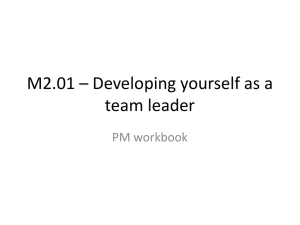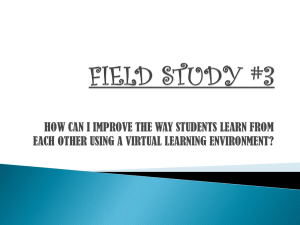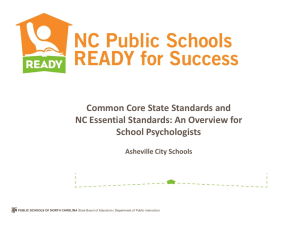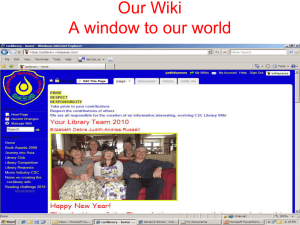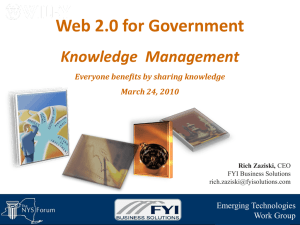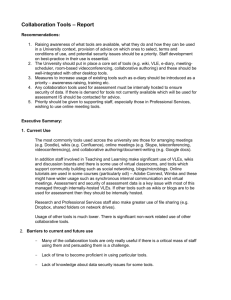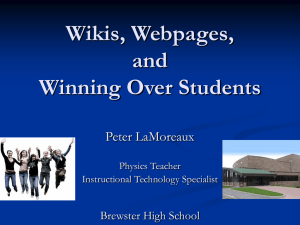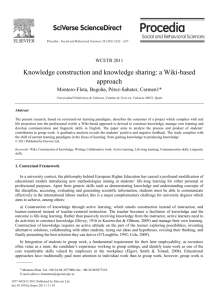presentation slides
advertisement
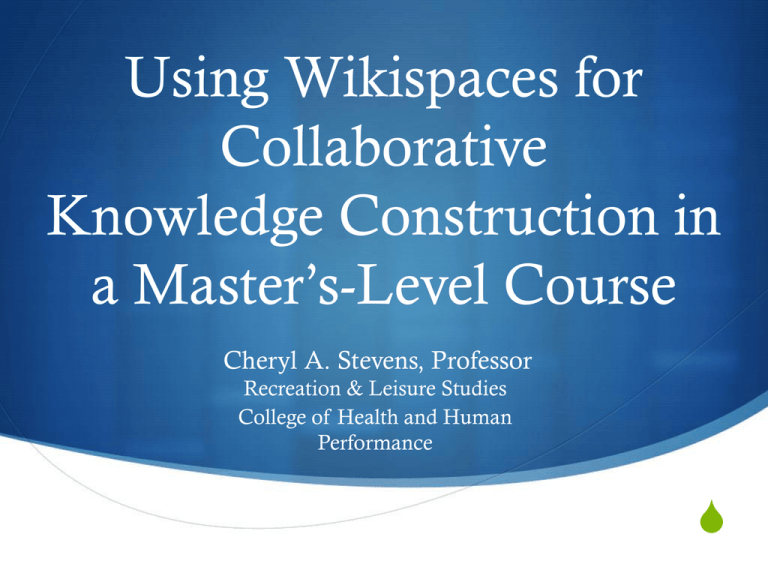
Using Wikispaces for Collaborative Knowledge Construction in a Master’s-Level Course Cheryl A. Stevens, Professor Recreation & Leisure Studies College of Health and Human Performance S What the literature says Wikis are promising for several reasons. Students can use them in a variety of cooperative ways (e.g., group discussions, collaborative summary of course concepts, and collaborative writing/editing of writing assignments or projects). Also, students are familiar with the technology from their every day lives (e.g., Wikipedia). Research indicates that students who engage in collaborative learning retain what they have learned longer than those who learn alone. Slotter, E. B., (2010). Using Wiki contributions to induce collaborative learning in a psychology course. International Journal of Technology in Teaching and Learning, 6(1), 33-42. What the literature says A wiki glossary of key course concepts built by graduate students was analyzed to determine what students did and did not do (i.e., adding, editing, and deleting information). The two main findings, in the context of previous research, were: (1) students added content to the wiki more frequently than they deleted existing text; and, (2) contrary to previous research, these students modified existing texts to a greater extent than previously reported (however, this was a course requirement). The authors indicated that students face difficulties when writing collaboratively and teachers should design collaborative learning activities to help students overcome these difficulties. Meishar-Tal, H. & Gorsky, P. (2010). Wikis: What students do and do not do when writing collaboratively. Open Learning, 25(1) 25-35 What the literature says Doctoral students constructed literature reviews in a wiki so their articles could be reviewed by peers and tutors. The authors evaluated the quantity and quality of contributions and students’ perceptions. Findings suggested that a wiki can promote effective collaborative learning and confidence in formative self and peer assessment by facilitating rapid feedback, vicarious learning through observing others’ contributions, and easy navigation and tracking. Su, F., & Beaumont, C. (2010). Evaluating the use of a wiki for collaborative learning. Innovations in Education and Teaching International, 47(4), 417-431 DOI: 10.1080/14703297.2010.518428 What the literature says In an introductory, undergraduate technology course wiki use was influenced by student’s prior experience with wikis, ease of access to wikis and with their perceived usefulness of wikis. Students’ attitudes towards using the wiki were strongly influenced by their teacher’s attitudes towards the wiki. If they saw the wiki as a tool for helping them with their assignments, and intended to use wikis in the future, they were likely to see them as useful. Guo, Z., & Stevens, K. J. (2011). Factors influencing perceived usefulness of wikis for group collaborative learning by first year students. Australasian Journal of Education Technology, 27(2), 221242 A Master’s-Level Course The learning outcomes for RCLS 6000, Philosophical and Sociological Issues in Leisure, require students to summarize, synthesize, integrate, and apply information in order to explain the potential for leisure and recreation for easing societal problems, with particular application to the student’s area of specialization. Using Wikispaces for Collaborative Knowledge Construction S Using a Wikispace page, the students and instructor are collaboratively built a glossary of key course concepts and application ideas throughout the semester. The Wikispace had one page per course topic. S Link to Learning and Future Student Needs: S The completed Wikispace serves as a resource for students’ exams. S Following the course, students will continue to have access the Wikispace for comprehensive exams and workplace applications. How we used the wiki We used Wikispaces. www.wikispaces.com provides free accounts for use in K-12 and Higher Education. Students were “invited” to join Wikispaces via an instructor-generated email. An access link to the class page is embedded in Blackboard. The instructor created an outline of concepts and questions for each topic. The outline was shared with students prior to class discussion. Two example outlines are provided. During discussion, students agreed on which students would have primary responsibility for summarizing information related to each concept/question. How we used the wiki The outline contained some questions that all students respond to (e.g., application ideas, summary thoughts) The instructor edited the Wiki page prior to the next class and delivered summary comments during class (face-to-face). Each student was awarded a participation grade based on criteria from a grading rubric. The quality and quantity of Wikispaces posts, tracked via the history feature, are a part of that grade. An example grading rubric is provided Keys to Using the Wikispace Successfully The Wikispace is explicitly connected to students’ completion of future assignments including the midterm and final exams and comprehensive exams. If it seems like “busy work” they won’t do it well. Advantages: Free, easy to use and track, students can continue to access information after the course is completed, information is saved in stages, it’s easy to add links and attach files. History is easy to track. Privacy settings are available. Disadvantages: Tools for modifying appearance of Wikispaces are somewhat limited; Students are reluctant to modify other students’ posts. Home page and grading rubric Sample from our wikispace Live well www.ecu.edu/rcls
